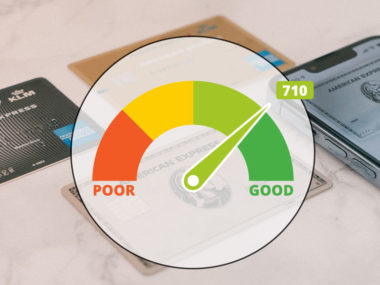
Staying on top of your credit score is a smart financial decision, especially since so many financial opportunities in life are centered around this information. Things like buying a house, renting an apartment, and getting a job can all be influenced by your credit score.
Knowing when credit scores are updated means that you can make checking them a regular part of your schedule. That way, you don’t check it more often then you need to, which could be frustrating and time wasting. While most people will just want to check their credit score a few times a year, if you are actively working on improving your score, or trying to get mistakes removed from your credit report, checking it as often as possible becomes essential.
Table of Contents
Your Credit Score Updates When It Gets New Information
The short answer is: your credit score updates about once a month, but it can be more complicated than that. Your credit score is based off the information reported by all your lenders, creditors, banks, and other financial relationships (landlord, utility companies, even the IRS) to the three major credit bureaus (TransUnion, Equifax, and Experian).
This means that when your credit report updates, your credit score is reflexively updated. If no new information has been reported every time you request a credit score, then the number will stay the same. For example, if you pay off a loan, a month later, that loan is still paid off, and there is no new payment activity to report. That lender no longer has new information to deliver to the bureaus.
When Do Credit Reports Update?
Since credit scores rely completely on a reporting for their information, the real question becomes, “when do credit reports update?”
This depends on how many lines of credit and other debts you currently have, and how often you use them; this is known as your credit utilization. It also depends on the companies that you owe money to and how often they send their information to the credit bureaus.
Some information is sent immediately, like when somebody makes a hard inquiry to your credit report in order to consider giving you a loan or credit card. That information is instantly added to your credit report, and can affect your credit score in almost realtime. Additionally, if you have too many hard inquiries on your credit report, you can watch your credit score go down because of it. This is because hard inquires are often people checking your credit report in order to authorize a loan. If you have a bunch of hard inquires, it shows you are in need of money and looking for multiple places to get that money. This behavior is a red flag and will lower a credit score.
Other types of information are only sent once a month, or maybe even once every few months. There is no law saying companies have to send their information to the credit bureaus by a specific deadline. These companies also don’t have to report to all three bureaus, meaning some credit reports might be more accurate than others. Reporting is all done on what is essentially a voluntary basis.
Bottom line: the average amount of time for your credit report to updated within is once a month. Typically, after you send your monthly credit card payment (or any debt-related payment), the information that your account is “up to date” is sent to a credit bureau. Alternatively, if you fail to send your payment on time and miss the due date, that account may appear on reports as being “past due” until the next month, when the information gets updated again. This is part of the reason why it is important to be on time with all payments: even if you are just a little behind, the impact to your score could be magnified by the normal reporting schedule.
How Often Should You Be Checking Your Credit Score?
Being on top of the health of your credit is important, but not something that should consume your life. For an average person, you should really only need to check your credit score a few times every year. This is really just to make sure nobody has stolen your identity, or that some great mistake isn’t ruining your credit.
If you are actively trying to build your credit, you’ll want to check your score more often. That way, you can see what is working and what doesn’t. In this scenario, checking your credit score once a month is perfect. You will be able to see if what you are doing is working, and adjust your plans accordingly to improve your score as quickly as you can.
Where You Check Your Score Matters
There are many different ways and places you can get your credit score. Just a few places include: your bank, credit score websites, from the credit bureaus themselves, financial advisors, and more. When getting your credit score, it’s important to know how recent the credit report the person crunching the numbers has, where they got it from, and what method they are using to get your credit score.
For example, if you get one credit score directly from a bureau and another one from a bank, there could be some fluctuations. This could be because the bank has an older credit report and hasn’t updated their records, or that they pulled their report from a different bureau entirely.
It’s also important to note that each report weighs certain credit factors differently. That can also lead to differences between credit scores. That’s why it’s important to know where the information backing up your credit score comes from. As long as you know that, and stay updated to your credit score, you can have a good idea of what you need to do to either get, or keep, a strong credit score.
Find out how to check your score and what it means at our credit score resource center. If you find errors on your credit report, be sure to send a dispute letter to the credit bureaus.
Image Source: https://depositphotos.com/






